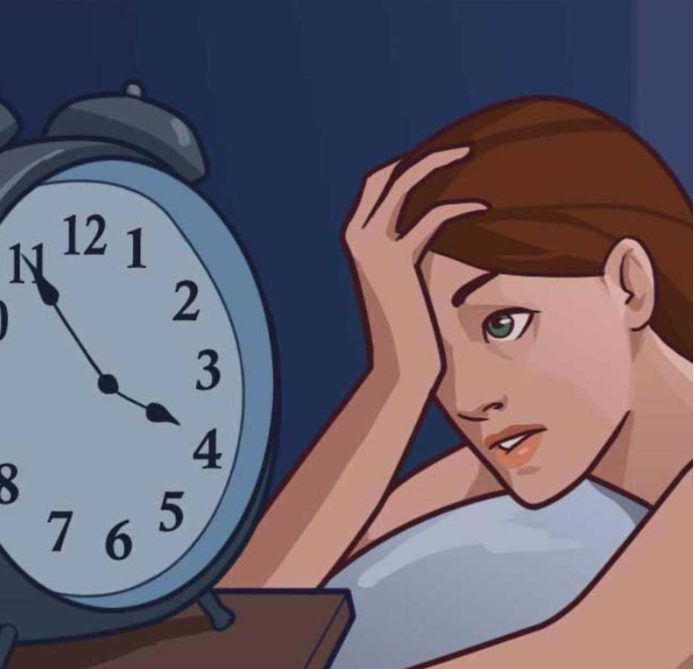If you suddenly find yourself waking up at the same time every night, you’re not alone. This frustrating phenomenon is surprisingly common, and while it can leave you puzzled, it may also be a clue to underlying issues that affect your sleep. Understanding the potential causes behind these nightly interruptions can help you improve your sleep quality and overall well-being. In this article, we’ll explore the most common reasons why you may be waking up at the same time each night and provide actionable solutions to get your sleep back on track.
1. Stress and Anxiety: The Invisible Sleep Disruptors

One of the most common reasons for waking up at the same time each night is stress or anxiety. When you’re feeling overwhelmed or worried, your body’s fight-or-flight response can activate, even while you’re asleep. This response triggers the release of stress hormones, which can cause sudden awakenings, leaving you wide awake in the middle of the night with racing thoughts.
What can you do? Try incorporating relaxation techniques into your bedtime routine. Practices like deep breathing, meditation, or progressive muscle relaxation can help calm your nervous system and reduce the chances of anxiety-induced wake-ups. Setting aside time to unwind before bed, free from work or stressful activities, can help prepare your mind for a more peaceful night’s rest.
2. Medical Conditions: Sleep Apnea and Other Sleep Interruptions
Waking up at the same time every night could also be a sign of an underlying medical condition. One of the most prevalent conditions linked to disrupted sleep is sleep apnea, a disorder where breathing temporarily stops and starts during sleep, often causing multiple awakenings throughout the night. Other conditions like restless leg syndrome, hyperthyroidism, or acid reflux can also affect your ability to stay asleep.
If you suspect a medical issue is causing your nightly interruptions, it’s important to consult with a healthcare professional. Sleep studies or other diagnostic tests can help pinpoint the cause, and treatments—ranging from CPAP machines for sleep apnea to medications for reflux—can dramatically improve your sleep.
3. Poor Sleep Environment: Creating a Sanctuary for Rest
Your sleep environment plays a crucial role in determining how well you sleep. Factors like room temperature, noise levels, and light exposure can all impact your ability to stay asleep. If your room is too warm or too noisy, your body may find it hard to maintain a restful sleep, which can result in frequent wake-ups.
Optimizing your bedroom for sleep is essential. Make sure your room is cool, quiet, and dark. Investing in blackout curtains, using earplugs, or utilizing a white noise machine can create an environment more conducive to uninterrupted rest. Even small changes like adjusting your pillow or mattress for better comfort can make a significant difference.
4. Lifestyle Habits: How Your Daily Routine Impacts Your Sleep
Our daily habits often have a larger impact on our sleep than we realize. Consuming caffeine or alcohol too close to bedtime can interfere with your sleep cycle, making it difficult to stay asleep through the night. Additionally, irregular sleep schedules or excessive screen time before bed can disrupt your natural circadian rhythm, leading to those pesky 3 a.m. wake-ups.
To improve your sleep, try establishing a consistent sleep routine. Go to bed and wake up at the same time each day, even on weekends, to train your body to follow a regular pattern. Limit screen time before bed, as the blue light emitted by phones, tablets, and computers can suppress melatonin production, making it harder for you to fall—and stay—asleep. Consider winding down with a book or a relaxing activity instead.
5. Hormonal Fluctuations: The Role of Aging and Hormones in Sleep Patterns

As we age, our sleep patterns naturally change. Hormonal shifts, especially in women going through menopause or individuals dealing with hormonal imbalances, can contribute to frequent awakenings during the night. The decline in melatonin production with age also makes it harder to maintain deep sleep, causing more frequent sleep disruptions.
If you suspect hormones are affecting your sleep, it may be worth discussing your symptoms with a healthcare provider. They can recommend strategies or treatments, such as melatonin supplements or lifestyle adjustments, to help regulate your sleep patterns.
6. Sleep Cycles: Understanding Your Body’s Natural Rhythm
Our sleep follows a series of cycles, each lasting about 90 minutes. During these cycles, we move through different stages of sleep, including light sleep, deep sleep, and REM sleep. Waking up at the same time every night could simply mean that you are transitioning between sleep cycles and becoming more easily awakened during a lighter phase of sleep.
To help align your sleep cycles with your body’s natural rhythm, make sure you’re giving yourself enough time to rest. Aim for 7-9 hours of sleep each night, and try to wake up at a time that coincides with the end of a sleep cycle, rather than the middle. There are even apps available that can help track your sleep and wake you at the optimal time in your cycle.
Conclusion: Identifying the Cause and Regaining Restful Sleep

Waking up at the same time every night can be frustrating, but understanding the root cause is the first step toward solving the problem. Whether it’s stress, medical conditions, a poor sleep environment, or lifestyle habits, addressing these factors can help you achieve more restful, uninterrupted sleep. By making simple changes like improving your sleep environment, managing stress, or seeking medical advice when necessary, you can improve the quality of your sleep and, in turn, your overall well-being.
If your nightly awakenings persist, don’t hesitate to consult a sleep specialist or healthcare professional to explore further solutions. Restful sleep is not only essential for your physical health but also for your mental and emotional well-being, so it’s worth taking the time to find a solution that works for you.


